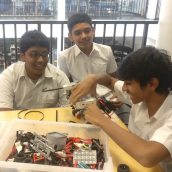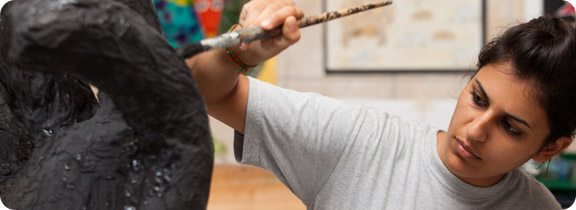
Educational Philosophy
Education is a creative, joyful process that engenders hope and curiosity. Through a diverse and rigorous curriculum, the Aga Khan Academies strive for the development of the whole person. Academies students will be able to contribute to and positively influence their communities. Through academic, athletic and artistic pursuits, they become lifelong learners and leaders.
Education is most relevant and inspiring when it connects young people to the world around them. By encouraging students to think flexibly and to connect their learning to real issues, the Academies build curiosity, compassion and a desire to make a difference.
The programmes of the International Baccalaureate curriculum have therefore been adapted to the specific environment of each Academy, with students developing a deep grounding in their local context alongside learning about relevant international issues and ideas.
An Academies education engenders a pluralistic and ethical approach to life and leadership.
Diverse educational experiences mean that students develop the willingness to embrace difference, and to learn from it. From the very youngest years, everyone works together to develop a sense of civic responsibility and service.
All students are encouraged to use their understanding and skills to take meaningful and sustainable action that makes a real difference to the lives of others.
"...above all, it is my hope that these schools will stimulate creativity, intellectual curiosity and honest inquiry so that their students can adapt and thrive in a world of rapid change; can make informed judgements on life’s daily challenges, and place those judgements in an ethical framework."
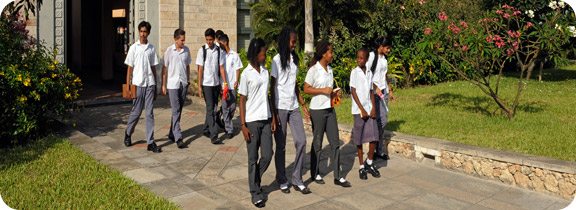
Student Leadership
The Academies’ programmes aim to develop students who are ethical, public-minded and who possess a pluralistic outlook. Both curricular and enrichment activities work to educate effective home-grown leaders who are actively engaged in their local communities and are aware of the implications of their actions. Through their participation in enrichment programmes, students are encouraged to take on leadership positions in a variety of different forms (e.g. house leaders, student council, team captains, dorm duties).
Not only do these opportunities provide an environment to explore and enhance skills such as cooperation and problem solving, they also enable students to set personal goals and challenge themselves. Student leadership activities vary from community service opportunities to sports and expressive arts. Students have opportunities to participate in the Student Representative Council (SRC) and other similar activities.
"The conviction that home-grown intellectual leadership of exceptional calibre is the best driver of a society’s destiny, underpins the Ismaili Imamat’s endeavour to create catalytic centres of educational excellence." Leadership activities instil in participants a sense of community ownership, creativity and a collaborative spirit, and prepares them for a lifetime of active engagement and leadership.
Student leadership in action:
Student Representative Council: The SRC is made up of students from all year levels, year 6 to second year Diploma Programme (DP2). Two DP2 presidents oversee the entire body, while first year Diploma Programme executive members oversee various subcommittees. These subcommittees include: academics, action, expression, citizenship, houses, finance, and residential. Click here to read news from the SRC.
Year 10: As part of the leadership programme, the year 10 students participated in a very successful Zawadi Bazaar by running eight socially responsible business stalls. Read the full story here.
Year 9: Students engaged in an exciting project to improve cohesion between the Junior and Senior Schools, as well as to raise house spirit. Read the full story here.
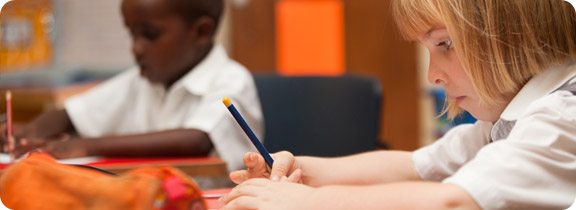
The Aga Khan Academy Curricular Strands
The Aga Khan Academy Curricular Strands are a unique part of the programme offered by the Aga Khan Academies. The strands are areas of learning aimed specifically at developing knowledge, skills and attitudes required by future leaders.
Our goal at the Academies is to develop young people who have strong local roots and are also globally minded. They should be able to become leaders in whichever fields they choose.
To help achieve this goal, we have identified five areas of learning, or strands, that we believe are important for our students. These are:
- Ethics
- Pluralism
- Economics for Development
- Cultures (including Muslim Cultures)
- Governance and Civil Society.
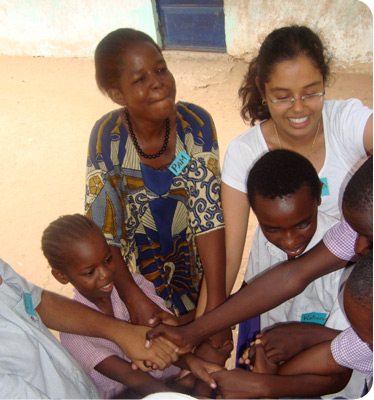 Implementing the Strands
Implementing the Strands
The strands are not taught as independent subjects. Instead, we weave them into the existing subject areas of the academic curriculum. They help inform the selection of content and themes for study. The strands also provide direction for school life outside the classroom in areas such as policy making, recruitment, student life and residential life.
Two of the strands, Ethics and Pluralism, help students develop values and dispositions required by ethical leaders. Our students learn about these areas in theory and are also encouraged to practice what they learn in their everyday lives.
Through the other three strands, our students learn about ideas that are important to the functioning of societies. In particular, they learn about how these ideas impact people’s lives in countries of the developing world. The knowledge they gain helps them understand key issues from both local and international perspectives.
The Strands in Practice
The strands were developed at the first Aga Khan Academy in Mombasa and are designed to be used in different cultural contexts. Teachers from the Aga Khan Academy, Dar-es-Salaam will help tailor the strands for the local environment in Tanzania.
Through the strands, our students develop attitudes and values that will help them throughout their lives. They also gain knowledge and understanding that will allow them to contribute positively to their societies in the future.
For more information on the educational programme offered at the Aga Khan Academy, Dar-es-Salaam, please visit the Academic Programme page.
Service Learning Workshops
Our AKA Mombasa Service Learning workshop will take place from 3-5 May 2024.
About our Service Learning Workshop
At the core of education lies the transformative power of service learning, and this workshop is designed to empower leaders like you to drive impactful change within your educational community. Recognised by the International Baccalaureate Audit 2022 for our "Outstanding Service Learning Programme" and AISA (Association of International Schools in Africa) for “Best Whole School Service Learning Programme” we are eager to share insights, strategies, and experiences that have propelled our programme to new heights.
What to Expect:
Innovative Strategies: Gain a deep dive into avant-garde service learning strategies that deliver authentic impact.
Inspiring Discussions: Engage in insightful discussions with fellow leaders, sharing best practices and lessons learned.
Transformative Journey: Immerse yourself in a transformative journey of self-discovery and professional growth.
Practical Insights: Acquire practical insights that can be seamlessly integrated into your educational environment.
Gala Dinner:
We are hosting a gala dinner on the second day of the workshop to mark the momentous occasion. Our theme is ‘summer in the tropics,' highlighting Mombasa’s vibrant coastal charm. Consider joining us and growing your connections by the scenic waters of the Indian Ocean.
Workshop fees
Early Bird: USD 250: 12 February-17 March
Regular: USD 300: 18 March-8 April
Gala Dinner: USD 50
Workshop Details
For additional workshop details, including the schedule click here.
Registration form
To register click here
An invoice will be sent to you once we receive the payment confirmation. The fees must be paid in full before the deadline and a receipt will be issued.
For any queries, please contact servicelearning@agakhanacademies.org
Rudra Potluri - dreaming up the future
Rudra has grown into himself since joining the Academy in 2013, most notably through the enrichment programme through which he discovered robotics and design. His work with robots stems from his enthusiasm for engineering, but Rudra has gone beyond just tinkering. “When I was learning robotics as part of enrichment, I never imagined that I would become captain of a robotics team,” said Rudra. Rudra captained a robotics team in January 2018 at the FIRST Lego League competition in Bengaluru. This was the first ever robotics competition that Academy students entered in.
“It didn’t stop there,” he continues, “the Academy provided a platform for me and my team to share our learning and knowledge with the community by letting us conduct a workshop for government schools.” Rudra was part of a team that hosted 48 grade six students for a day, teaching them about robotics and design. “The most unique thing about the Academy is that it doesn’t just stop at teaching, it makes sure that students apply their knowledge in the real world and give something back to society.” Rudra also participated in the Chinna Shodha Yatra, travelling around rural Andhra Pradesh to understand nuances of life in local communities.
In 2014, India's ambitious Mars Orbitor Mission came to fruition and Rudra had the opportunity to take part in a live telecast discussion about the mission on state TV. The following year, Rudra was selected as a Microsoft student ambassador and got to attend a workshop at the Microsoft headquarters in New Delhi. In grade 10, he used his MYP personal project as a chance to explore his interests in engineering and software and built a home automation system. "My aim was to make it for my grandparents, who are older and can’t move around as easily anymore,” he says about the Smarthome Automation System. His SAS, at ₹2,000 per room, is a cost effective alternative to existing systems in the market, which can cost upwards of ₹70,000. In the same year, Rudra showed initiative in his design project, choosing to build a quadcopter. The drone was created to support the Academy's existing security system.
In May 2018, outside robotics events, Rudra also headed the IT and design unit of the Academy’s first ever TEDx. It comes as no surprise then to know that Rudra is considering studying computer engineering after school. Rudra has applied to the Michigan Institute of Technology (MIT) in the USA, and the University of Waterloo, Canada.
Rudra earned a fellowship to spend the 2018 summer vacation in Ryerson University, Toronto, to take part in the Ryerson DMZ Sandbox Basecamp, a workshop for socially conscious young innovators. The urban university is a renowned research institution and we are positive Rudra's contribution will be significant and impactful.
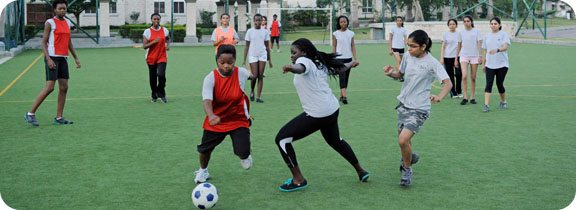
Sporting Activities
One of the goals of the Aga Khan Academy Mombasa is to create principled young people with a strong sense of integrity, honesty, fairness and justice, who respect the dignity of others.
Physical education, and competitive games and sports prepare our students for real-life situations, encouraging them to take leadership roles and allowing them to tackle challenges confidently and in a spirit of cooperation.
Inter-school sports
Both Junior and Senior School students have the opportunity to represent their school in various sports, such as swimming, cricket, rounders, basketball, hockey, netball, football and athletics.
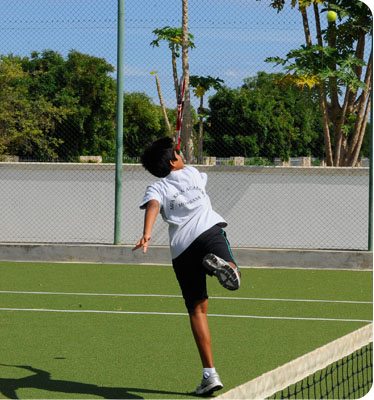
Our teams train regularly during the week and cater to students of all ability levels.
Clubs
We offer a diverse selection of sporting activities for our students during after school clubs.
Inter-house events
Students of both the Junior and Senior Schools are allocated to houses. We hold a number of inter-house events during the year, including the inter-house swimming gala and inter-house athletics.
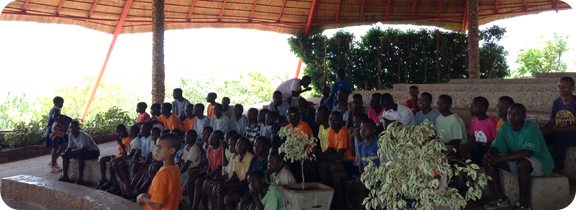
Community Service
Community service is a major part of the student experience at the Academy. Both the curriculum and student life incorporate aspects of community service.
Service opportunities extend the educational experience beyond the classroom and help our students learn about the real-world implications of their studies.
Through community projects with local organisations and groups, our students gain a sense of the connections between their education and the world around them. Students can participate in a variety of structured community initiatives and internships to learn about their place in the world.
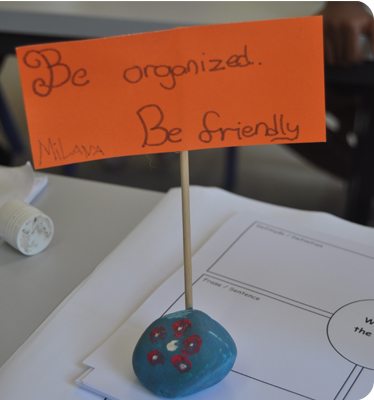 By partnering with local agencies of the Aga Khan Development Network, students learn first-hand about the operations of an organisation, and work toward making tangible contributions to the agencies.
By partnering with local agencies of the Aga Khan Development Network, students learn first-hand about the operations of an organisation, and work toward making tangible contributions to the agencies.
In addition, community engagement gives our students an understanding of broad concepts such as human rights, dignity and autonomy, while emphasising the ethos of leaving the world a better place.
To learn more about the Academy's programme, please visit the Academic Programme page.
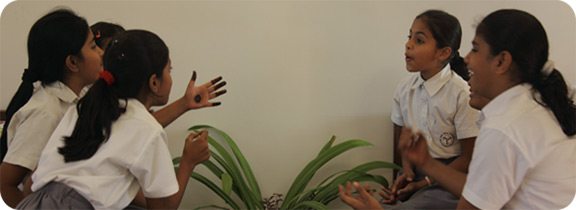
Community Service
Community service is a major part of the student experience at the Academy. Both the curriculum and student life incorporate aspects of community service.
Service opportunities extend the educational experience beyond the classroom and help our students learn about the real-world implications of their studies.
Through community projects with local organisations and groups, our students gain a sense of the connections between their education and the world around them. Students can participate in a variety of structured community initiatives and internships to learn about their place in the world.
 By partnering with local agencies of the Aga Khan Development Network, students learn first-hand about the operations of an organisation, and work toward making tangible contributions to the agencies.
By partnering with local agencies of the Aga Khan Development Network, students learn first-hand about the operations of an organisation, and work toward making tangible contributions to the agencies.
In addition, community engagement gives our students an understanding of broad concepts such as human rights, dignity and autonomy, while emphasising the ethos of leaving the world a better place.
To learn more about the Academy's programme, please visit the Academic Programme page.
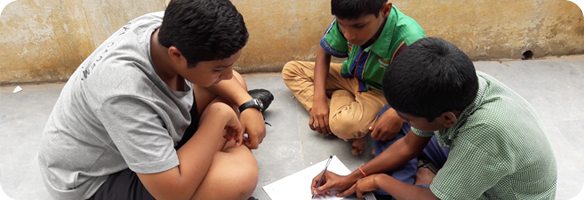
Community Service
Community service is a major part of the student experience at the Academy. Both the curriculum and student life incorporate aspects of community service.
Service opportunities extend the educational experience beyond the classroom and help our students learn about the real-world implications of their studies.
Through community projects with local organisations and groups, our students gain a sense of the connections between their education and the world around them. Students can participate in a variety of structured community initiatives and internships to learn about their place in the world.
By partnering with local agencies of the Aga Khan Development Network, students learn first-hand about the operations of an organisation, and work toward making tangible contributions to the agencies.
"The students at this institution will be distinguished not only for their academic capacity, but for their character and commitment to citizenship."
In addition, community engagement gives our students an understanding of broad concepts such as human rights, dignity and autonomy, while emphasising the ethos of leaving the world a better place.
To learn more about the Academy's programme, please visit the Academic Programme page.
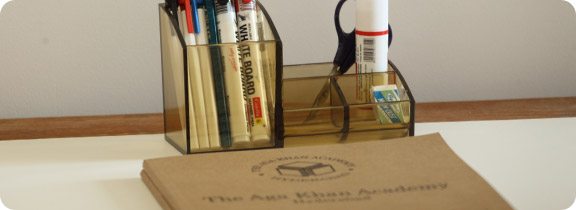
Admissions Enquiries
Our admissions team can help with all queries about becoming a student at the Academy and with questions regarding the application process.
Admissions for the 2025-2026 session are open now. A few spots are still available for the 2024-2025 session. Contact us now for detailed information.
On our 17-acre, state-of-the-art, award-winning campus, exceptional students from all backgrounds across Dhaka are provided with an education of the highest international standard to prepare them for leadership, service and lifelong learning, all of which are needed to succeed in a globally competitive world.
Application forms are available here. For more information, please contact our admissions department at +8801709997510 or admissions.dhaka@agakhanacademies.org.
Admissions office contact information:
Admissions Manager: +8801709997510
Dean of Admissions: +8801709997563
Email: admissions.dhaka@agakhanacademies.org
Write to the Aga Khan Academy Dhaka (online form)
For general inquiry/reception, please contact:
Mobile: +8801709997515
Telephone: +880 9638-400600, +8809638-111222
Where to find us:
The Aga Khan Academy Dhaka
Ka-65/1, Kuratoli
Dhaka – 1229,
Bangladesh
